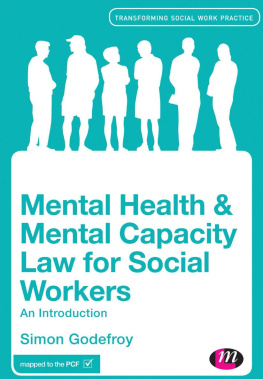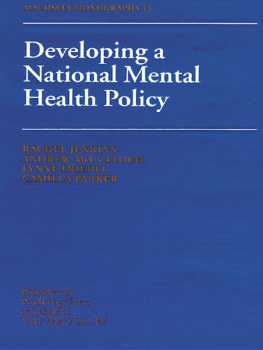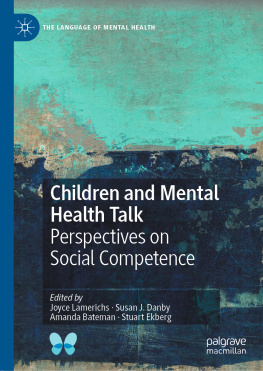SPACE, PLACE AND MENTAL HEALTH
Geographies of Health
Series Editors
Allison Williams, Associate Professor, School of Geography and Earth
Sciences, McMaster University, Canada
Susan Elliott, Dean of the Faculty of Social Sciences,
McMaster University, Canada
There is growing interest in the geographies of health and a continued interest in what has more traditionally been labeled medical geography. the traditional focus of medical geography on areas such as disease ecology, health service provision and disease mapping (all of which continue to reflect a mainly quantitative approach to inquiry) has evolved to a focus on a broader, theoretically informed epistemology of health geographies in an expanded international reach. As a result, we now find this subdiscipline characterized by a strongly theoretically-informed research agenda, embracing a range of methods (quantitative; qualitative and the integration of the two) of inquiry concerned with questions of: risk; representation and meaning; inequality and power; culture and difference, among others. Health mapping and modeling has simultaneously been strengthened by the technical advances made in multilevel modeling, advanced spatial analytic methods and GIS, while further engaging in questions related to health inequalities, population health and environmental degradation.
This series publishes superior quality research monographs and edited collections representing contemporary applications in the field; this encompasses original research as well as advances in methods, techniques and theories. The Geographies of Health series will capture the interest of a broad body of scholars, within the social sciences, the health sciences and beyond.
Also in the series
Healing Waters
Therapeutic Landscapes in Historic and Contemporary Ireland
Ronan Foley
ISBN 978 0 7546 7652 2
Towards Enabling Geographies:
Disabled Bodies and Minds in Society and Space
Edited by Vera Chouinard, Edward Hall, and Robert Wilton
ISBN 978 0 7546 7561 7
Geographies of Obesity: Environmental Understandings of the Obesity Epidemic
Edited by Jamie Pearce and Karen Witten
ISBN 978 0 7546 7619 5
Space, Place and Mental Health
SARAH CURTIS
University of Durham, UK
First published 2010 by Ashgate Publishing
Published 2016 by Routledge
2 Park Square, Milton Park, Abingdon, Oxon OX14 4RN
711 Third Avenue, New York, NY 10017, USA
Routledge is an imprint of the Taylor & Francis Group, an informa business
Copyright 2010 Sarah Curtis
Sarah Curtis has asserted her right under the Copyright, Designs and Patents Act, 1988, to be identified as the author of this work.
All rights reserved. No part of this book may be reprinted or reproduced or utilised in any form or by any electronic, mechanical, or other means, now known or hereafter invented, including photocopying and recording, or in any information storage or retrieval system, without permission in writing from the publishers.
Notice:
Product or corporate names may be trademarks or registered trademarks, and are used only for identification and explanation without intent to infringe.
British Library Cataloguing in Publication Data
Curtis, Sarah, 1954-
Space, place and mental health. -- (Ashgates geographies of health series)
1. Mental health--Environmental aspects. 2. Mental illness--Environmental aspects. 3. Environmental psychology. 4. Mind and body. 5. Medical geography.
I. Title II. Series
616.8'9071-dc22
Library of Congress Cataloging-in-Publication Data
Curtis, Sarah.
Space, place and mental health / by Sarah Curtis.
p. cm. -- (Ashgates geographies of health series)
Includes bibliographical references and index.
ISBN 978-0-7546-7331-6 (hardback)
1. Medical geography. 2. Human geography. 3. Mental health. 4. World health. I. Title.
RA792.C87 2010
614.4'2--dc22
2010003964
ISBN 978 0 7546 7331 6 (hbk)
ISBN 978 1 3156 1016 0 (ebk)
Contents
List of Figures
List of Boxes
Foreword
This book aims to provide an overview of research on mental health from a geographical perspective and to show how and why space and place are important for mental health of individuals and populations. One objective is to move forward the research agenda in this field by considering in combination fields of research which are often treated rather separately. The book aims to interest an interdisciplinary audience of researchers concerned with mental health of individuals and population. The book is also intended to offer an introduction for higher level undergraduate and postgraduate students who may be undertaking courses in health geography, public health, sociology or anthropology of health and illness. For this reason I have attempted to provide some explanation of basic concepts throughout the discussion, and some specific illustrations of research ideas and methods have been presented in boxes which are intended to provide suitable cases for discussion in class. A summary of some possible learning objectives is offered at the end of each chapter (though these are illustrative rather than exhaustive) and some suggestions for introductory reading are also listed.
Acknowledgements
I would like to thank those who have helped in the production of this book and in the research on which this book is based. Special thanks go to staff at Ashgate and to Kimberley Armstrong and Jenny Laws at Durham for all their editorial assistance. Also I want particularly to thank my husband Brian Blundell for his unfailing support and good humour, without which this would not have got done.
Chapter 1
Mens Sana in Corpore Sano? Introduction to Geographical Perspectives on Health of the Mind and the Body
Summary
This book takes a geographical perspective on the growing public interest in mental health, happiness, and psychological wellbeing. It focuses on the significance of physical and social environments for these aspects of health. The aim is to explore how and why space and place are important for mental health and psychological wellbeing. The book reviews research that investigates geographical factors associated with risk of psychological distress or mental illness, or, conversely, with the chances of enjoying a healthy mental state and positive sense of wellbeing.
This chapter provides a preliminary overview of geographical perspectives, which draw on a range of theories and methods, to interpret the complex relationships between our mental health and the social and physical environment in which we live.
This chapter starts with a discussion of the scope of health geography. It introduces some themes that are important for what follows later in this book. These include geographical theories about space, and place as they relate to health geography. Also introduced in this chapter are related ideas about ways of conceptualising risk. Consideration is given to aspects of classic and more recent debates concerning dichotomies of mind and body and the connections between mental and physical health. This book focuses on selected aspects of the mind/body/environment complex, and the ways that states of mind are described in terms of positive mental health or psychological wellbeing, as well as aspects of mental illness and










